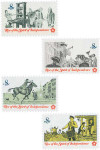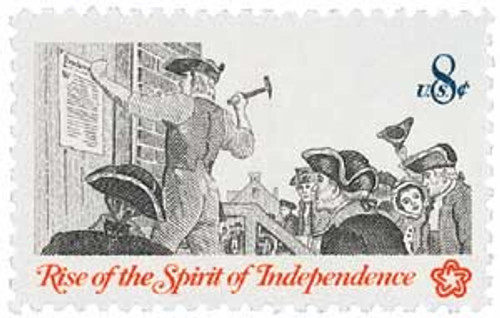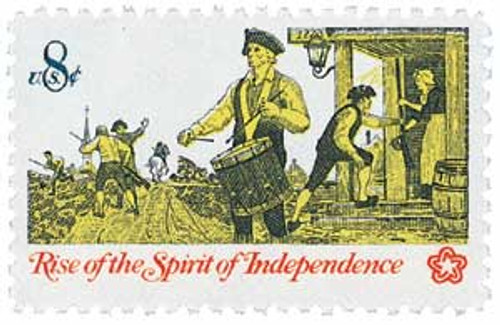
Complete Set, 1973 Colonial Communications
# 1476-79 - Complete Set, 1973 Colonial Communications
$1.00 - $12.75
U.S. #1476-79
8¢ Colonial Communications
Bicentennial Series
Bicentennial Series
Issue Date: Various dates in 1973
City: Various cities
Quantity: Various quantities
Printed By: Bureau of Engraving and Printing
Printing Method: Giori press (U.S. #1476-77) and Lithographed, engraved (U.S. #1478-79)
Perforations: 11
Color: Multicolored
Issued to commemorate the upcoming Bicentennial celebration, U.S. #1476-79 was a set of four stamps chronicling the many ways patriots communicated the spirit of independence during the American Revolution. Each of the set of four stamps was issued on a different date and in different cities.
“Printer and Patriots Examining Pamphlet” (U.S. #1476) was issued on February 16, 1973, in Portland, Oregon. Issued to salute the roles of printers and pamphleteers who produced the words to unite patriots, keep their courage high, and urge Americans to fight for freedom.
“Posting a Broadside” (U.S. #1477) was issued on April 13, 1973, in Atlantic City, New Jersey. Issued to point out the importance of communications during the Revolutionary War. Broadsides were posters that were displayed to keep the colonists aware of events or to spread propaganda.
“Postrider” (U.S. #1478) was issued on June 22, 1973, in Rochester, New York. Issued in honor of the post rider who carried the mail on horseback. He was an invaluable source of information as his travels from colony to colony enabled him to know the mood of the people.
“Drummer” (U.S. #1479) was issued on September 28, 1973, in New Orleans, Louisiana. The last in the series on Colonial Communications is the drummer who marched into battle or used his drum to summon his neighbors to defend their homes.
The Bicentennial Series
The U.S. Bicentennial was a series of celebrations during the mid-1970s that commemorated the historic events leading to America’s independence from Great Britain.
The official events began on April 1, 1975, when the American Freedom Train departed Delaware to begin a 21-month, 25,338-mile tour of the 48 contiguous states. For more than a year, a wave of patriotism swept the nation as elaborate firework displays lit up skies across the U.S., an international fleet of tall-mast sailing ships gathered in New York City and Boston, and Queen Elizabeth made a state visit. The celebration culminated on July 4, 1976, with the 200th anniversary of the adoption of the Declaration of Independence.
The U.S.P.S. issued 113 commemorative stamps over a six-year period in honor of the U.S. bicentennial, beginning with the American Revolution Bicentennial Commission Emblem stamp (U.S. #1432). As a group, the Bicentennial Series chronicles one of our nation’s most important chapters, and remembers the events and patriots who made the U.S. a world model for liberty.
U.S. #1476-79
8¢ Colonial Communications
Bicentennial Series
Bicentennial Series
Issue Date: Various dates in 1973
City: Various cities
Quantity: Various quantities
Printed By: Bureau of Engraving and Printing
Printing Method: Giori press (U.S. #1476-77) and Lithographed, engraved (U.S. #1478-79)
Perforations: 11
Color: Multicolored
Issued to commemorate the upcoming Bicentennial celebration, U.S. #1476-79 was a set of four stamps chronicling the many ways patriots communicated the spirit of independence during the American Revolution. Each of the set of four stamps was issued on a different date and in different cities.
“Printer and Patriots Examining Pamphlet” (U.S. #1476) was issued on February 16, 1973, in Portland, Oregon. Issued to salute the roles of printers and pamphleteers who produced the words to unite patriots, keep their courage high, and urge Americans to fight for freedom.
“Posting a Broadside” (U.S. #1477) was issued on April 13, 1973, in Atlantic City, New Jersey. Issued to point out the importance of communications during the Revolutionary War. Broadsides were posters that were displayed to keep the colonists aware of events or to spread propaganda.
“Postrider” (U.S. #1478) was issued on June 22, 1973, in Rochester, New York. Issued in honor of the post rider who carried the mail on horseback. He was an invaluable source of information as his travels from colony to colony enabled him to know the mood of the people.
“Drummer” (U.S. #1479) was issued on September 28, 1973, in New Orleans, Louisiana. The last in the series on Colonial Communications is the drummer who marched into battle or used his drum to summon his neighbors to defend their homes.
The Bicentennial Series
The U.S. Bicentennial was a series of celebrations during the mid-1970s that commemorated the historic events leading to America’s independence from Great Britain.
The official events began on April 1, 1975, when the American Freedom Train departed Delaware to begin a 21-month, 25,338-mile tour of the 48 contiguous states. For more than a year, a wave of patriotism swept the nation as elaborate firework displays lit up skies across the U.S., an international fleet of tall-mast sailing ships gathered in New York City and Boston, and Queen Elizabeth made a state visit. The celebration culminated on July 4, 1976, with the 200th anniversary of the adoption of the Declaration of Independence.
The U.S.P.S. issued 113 commemorative stamps over a six-year period in honor of the U.S. bicentennial, beginning with the American Revolution Bicentennial Commission Emblem stamp (U.S. #1432). As a group, the Bicentennial Series chronicles one of our nation’s most important chapters, and remembers the events and patriots who made the U.S. a world model for liberty.













